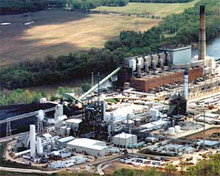Officials with Consol Energy Inc. of Pittsburgh and Houston-based Synthesis Energy Systems Inc. on Monday announced a joint venture to build the first modern coal-to-liquids plant in the United States at the Marshall County Industrial Park in Benwood. The project is expected to cost $800 million.
The plant is to utilize both coal and waste coal from the nearby Consol-owned Shoemaker Mine, said J. Brett Harvey, president and CEO of Consol Energy. Additional coal also could be brought in from the McElroy and Loveridge mines, which also are owned by Consol.
Construction on the plant could start in about a year if the needed permits are acquired, Harvey said. The project would then take about two years to complete.
Gov. Joe Manchin, who was in attendance for the announcement, indicated the state will be working to see the project obtains whatever permits it needs.
"West Virginia has stepped up to the plate. Everybody is talking about the energy crisis, but nobody is doing anything -- until now."
Consol and SES jointly have agreed to provide $20 million to start the front-end engineering design for the project.
The plant will convert coal to synthetic gas using SES' U-Gas technology. It is then expected that the syngas will be used to produce approximately 720,000 metric tons of methanol for the chemical industry, along with 100 million gallons of 87-octane gasoline.
Consol and SES have created Northern Appalachian Fuel LLC as the company to handle the process. They also are negotiating with ExxonMobil Research and Engineering to license their methanol to gasoline technology.
The U-Gas technology also contains a process by which carbon dioxide byproducts from coal are sequestered underground, which helps to lessen the environmental impact the plant could have, Vail said.
The Benwood plant will include a river terminal facility where products will be stored in tanks for off-loading into barges for ultimate delivery, according to information provided by Consol.
U.S. Sen. Jay Rockefeller also was in attendance Monday. He said West Virginia "is not waiting for someone else to fix" the nation's energy problems.
"West Virginia will be a global leader," Rockefeller said. "We as a nation are addicted to foreign oil. It's happening, and all of us have allowed it to happen.
"We need to do more drilling, both on land and off land. But all of this will take a long time to develop, and it won't bring the price down in the short term. It will eventually in the long-term."
Harvey termed Manchin "one of the few governors in the 50 states who can spell coal" and he added the governor was a major factor in achieving the agreement.
"West Virginia feels like home," he said. "It is home. We employ more than 3,500 people in the state, and we mine coal as safely as we can."
Harvey said Consol also places large investments in research technology, and that it welcomed the proposal by SES when it was brought before them.
"It will work," he said of the technology. "It will transform the nation."
Vail noted that SES already has built one coal-to-liquids plant in the world. It is located in Hai Hua, China.
"This is not a science experiment," he said. "We can clearly convert West Virginia's resources into fuel for transportation. We know how to do it cleanly and efficiently."
Consol spokesman Tom Hoffman said Consol sees the Benwood plant as a way to cash in on soaring world demand and limited supply of petroleum products.
"Most observers would say that the balance between supply and demand for petroleum products over the next several decades is probably going to be a precarious balance," Hoffman said. "If the U.S. can bring on liquids derived from our domestic reserves of coal it certainly not only brings more product onto the market, but from an energy-security standpoint, we think it's a good step."
The mining industry has long pushed for developing coal-to-liquids plants in the United States to open another market beyond electricity generation and steel manufacturing. South Africa has long relied heavily on coal for transportation fuel, as did Germany during World War II.
"It has already been demonstrated to be highly effective in certain countries like South Africa in this market," said Luke Popovich, a spokesman for the National Mining Association, a Washington, D.C.-based trade group. "This is not science fair technology that we have to wait for."

